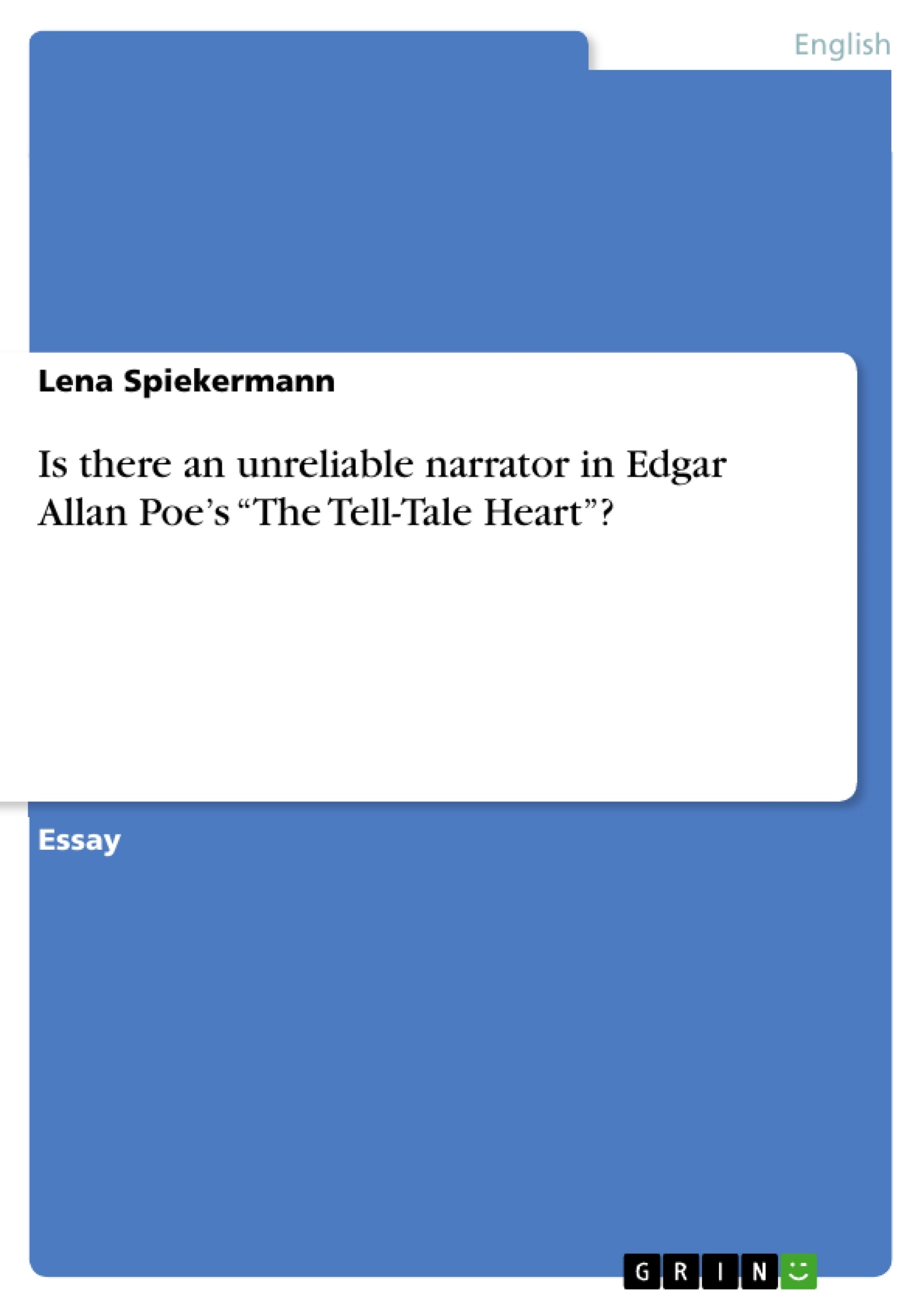Edgar Allan Poe’s short story “The Tell-Tale Heart” is not a “whodunit - we know right from the start who the murderer is.” (Benfey 29). The narrator describes in detail how he prepares and commits the murder of an old man, he lives together with. All of the time he “bases his plea upon the assumption that madness is incompatible with systematic action” (Robinson 94) and emphasises that he is not mad. “His plot is motiveless” (Hoffman 227), he only murders the old man because of his “Evil Eye” (Poe 278) and hides his dismembered body under the roofs of his room. After that he welcomes three police officers in the house and allows them to search the house. He still feels safe because he has perfectly hidden all indications for the deed. But then his own madness makes him go crazy, he thinks to hear the beating of the old mans heart so loud that it will betray him and finally he makes a confession of the murder.
The reader does not get to know much about the narrator of this story, he never learns his name, his job, in what town he lives (Benfey 32). There are various texts which try to explain this or the narrators trains of thought. This paper is meant to analyse the general kind of narrator, if there is an unreliable narrator or not and find proofs for the assumptions made.
Table of Contents
- 1. Introduction
- 2. Definition of the term “unreliable narrator”
- 3. Proofs for the unreliable narrator in "The Tell-Tale Heart"
- 3.1. Paratextual Signal
- 3.2. Contradictions
- 3.3. Psychological and emotional irregularities
- 3.4. Peculiarities on the stylistic level
- 4. Conclusion
- 5. Word Count
Objectives and Key Themes
This paper analyzes the narration in Edgar Allan Poe's "The Tell-Tale Heart" to determine whether the narrator is unreliable. It examines textual evidence to support this analysis.
- Reliability of Narration
- Analysis of Paratextual Signals
- Identification of Contradictions within the Narrative
- Examination of Psychological and Emotional Irregularities
- Stylistic Features Supporting Unreliable Narration
Chapter Summaries
1. Introduction: The introduction establishes the context of the paper, identifying "The Tell-Tale Heart" as a story where the murderer is known from the outset. It highlights the narrator's claim of sanity despite committing a premeditated murder, emphasizing the lack of clear motive beyond the old man's "Evil Eye." The introduction positions the paper's goal: to analyze the narrator's reliability based on various textual elements and existing critical interpretations.
2. Definition of the term “unreliable narrator”: This section defines the concept of an "unreliable narrator," drawing upon Wayne C. Booth's work and other scholarly sources. It clarifies the distinction between reliable and unreliable narrators, explaining how an unreliable narrator's account may be faulty, biased, or distorted. The chapter also touches upon the use of unreliable narration in different literary genres and its function in highlighting biased perspectives or character flaws.
3. Proofs for the unreliable narrator in “The Tell-Tale Heart”: This chapter presents evidence supporting the claim that the narrator is unreliable. It uses various analytical lenses to examine the text, such as analyzing paratextual signals (like the title itself), internal contradictions in the narrator's statements and actions, the narrator's psychological and emotional inconsistencies, and stylistic peculiarities that contribute to the overall unreliability of the narrative voice.
Keywords
Unreliable narrator, Edgar Allan Poe, The Tell-Tale Heart, narrative analysis, literary criticism, psychological analysis, textual analysis, paratext, contradiction, insanity.
Edgar Allan Poe's "The Tell-Tale Heart": A Narrative Analysis FAQ
What is the main focus of this paper?
This paper analyzes the narration in Edgar Allan Poe's "The Tell-Tale Heart" to determine whether the narrator is unreliable. It examines textual evidence, including paratextual signals, contradictions, psychological and emotional irregularities, and stylistic peculiarities, to support its analysis.
What are the key themes explored in the paper?
The key themes include the reliability of narration, analysis of paratextual signals (like the title), identification of contradictions within the narrative, examination of psychological and emotional irregularities of the narrator, and stylistic features supporting unreliable narration.
How is the concept of "unreliable narrator" defined in the paper?
The paper defines "unreliable narrator" by drawing upon scholarly sources, including the work of Wayne C. Booth. It clarifies the distinction between reliable and unreliable narrators, explaining how an unreliable narrator's account may be faulty, biased, or distorted. The function of unreliable narration in highlighting biased perspectives or character flaws is also discussed.
What types of evidence are used to support the claim of an unreliable narrator in "The Tell-Tale Heart"?
The paper uses multiple types of evidence: analysis of paratextual signals (like the title), internal contradictions in the narrator's statements and actions, the narrator's psychological and emotional inconsistencies, and stylistic peculiarities that contribute to the overall unreliability of the narrative voice.
What are the chapter summaries provided in the document?
The document provides summaries for each chapter: Chapter 1 introduces the context and the paper's goal. Chapter 2 defines "unreliable narrator." Chapter 3 presents evidence supporting the claim that the narrator is unreliable using various analytical lenses. The remaining chapters are a conclusion and a word count.
What are the keywords associated with this analysis?
The keywords include: Unreliable narrator, Edgar Allan Poe, The Tell-Tale Heart, narrative analysis, literary criticism, psychological analysis, textual analysis, paratext, contradiction, insanity.
What is the overall structure of the provided document?
The document is structured as a comprehensive language preview. It includes a table of contents, objectives and key themes, chapter summaries, and keywords. This preview is designed to offer a structured overview of the complete analysis.
- Quote paper
- Lena Spiekermann (Author), 2007, Is there an unreliable narrator in Edgar Allan Poe’s “The Tell-Tale Heart”?, Munich, GRIN Verlag, https://www.grin.com/document/180522




